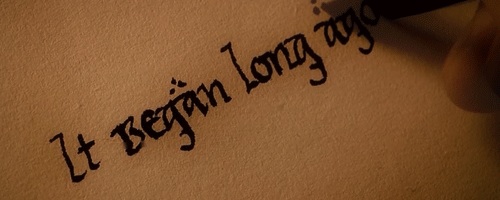I figure I’ve got the far ends of the literary spectrum covered: before diving face-first into the world of epic fantasy, I wrote poetry. At first blush, the two enterprises couldn’t look much more different. Although epic poetry has its share of gods and monsters, the work of lyric poets like Elizabeth Bishop, John Donne, and Anne Sexton tends to be short on orcs, fortresses, and magical glowing swords. Conversely, the verse contained in epic fantasy tends to fall into two categories: drinking songs and elvish; Dragonlance isn’t exactly replete with searing meditations in the tradition of George Herbert or Robert Lowell.
Given the disparity in modes and methods, the move from lyric poetry to epic fantasy seems to make about as much sense as heading into the Alaskan wilderness wearing Hawaiian leis and a grass skirt. I’ve found, however, much to my joy and surprise, that the hard won lessons of poetry are wonderfully useful; in the following series of posts, I’ll dig into the some of the most transferable lessons.
Sometimes it’s tough just getting a character out the door. A glance at my outline will remind me that some serious stuff has to happen in the chapter: there’s a stabbing coming up, or a political double-cross, or frantic chase across the steppe… But there’s my character, standing naked in the room where he just woke up, and I think, “My god, I have no idea how to get this asshole dressed and on his way.”
The temptation, of course, is to take my time. Epic fantasy can run close to a thousand pages, and that scope can give a writer the sense that there’s no urgency, that it’s okay to describe the dresser, the washbasin, the monastic robe, the stone of the walls, the wood of the door, the history of the tree from which it was carved. There’s a beguiling voice that whispers in your ear, “This is what the reader actually wants.”
This voice is deadly. It’s not that readers of fantasy don’t want vividly imagined worlds filled with concrete detail. They do. But not all the time. This, of course, is the problem with the middle books of the Wheel of Time. In a nutshell, too much getting dressed and getting out the door, not enough of anything else.
In this case, poetry provides a valuable corrective. A long lyric poem might run to a hundred lines; many are quite a bit shorter. A lyric poem is, some ways, the opposite of a fantasy epic. Elizabeth Bishop can capture the entirety of a heartbreaking domestic scene in thirty-nine lines (Sestina. Read it.), while George R. R. Martin’s still getting the tablecloth on the table.
The lyric poem is a reminder that sometimes the fastest way to get somewhere is to just go. In John Donne’s great poem, The Flea, for instance, we’re presented with three stanzas of nine lines each. The scene is simple: the poem’s speaker is trying to seduce a woman through some clever observations about a flea that has just bitten them. One of the amazing things about this piece is that all of the action takes places in the white space between the stanzas. In the first gap, the woman threatens to kill the flea. In the second, she kills it. These are the only two events of the poem, and Donne doesn’t even bother to show them to us. We understand from what comes before and after what has happened in between, and as a result the poem is able to stay focused where it belongs: in the creepy, wheedling voice of the speaker.
Or take the end of Auden’s classic The Fall of Rome. After six quatrains observing the creeping decrepitude of an empire at the brink of self-destruction, he wants to take us, by way of comparison, somewhere else, somewhere far away. In the hands of a different poet, shifting the scene could easily take a quatrain or two. Auden accomplishes it in two words. The last four lines read:
Altogether elsewhere, vast
Herds of reindeer move across
Miles and miles of golden moss,
Silently and very fast.
Epic fantasy involves a lot of to-ing and fro-ing, getting the hobbits out of mines and into elven woods, keeping those armies of orcs, or shadowspawn, or undead, or whatever moving across the countryside. There are so many transitions over the course of one of these huge stories, that it’s easy to get tangled up in them: And then she put her hand on the doorknob, a doorknob fashioned of the horn of a stag that her mother had brought down with a single shot in the long winter when the river froze straight through…
Whenever I feel myself buckling beneath this urge, I just think of Auden’s two words—Altogether elsewhere—and just like that I can cut hundreds of words, slash out entire chapters. We’re not just out the door, but mounted up and charging into the heart of the story.
After teaching literature, philosophy, history, and religion for more than a decide, Brian Staveley began writing epic fantasy. The Providence of Fire, the second installment in the Chronicle of the Unhewn Throne, publishes January 13th from Tor and Tor UK. He lives on a steep dirt road in the mountains of southern Vermont, where he divides his time between fathering, writing, husbanding, splitting wood, skiing, and adventuring, not necessarily in that order. He can be found on Twitter at @brianstaveley and also on his blog.










